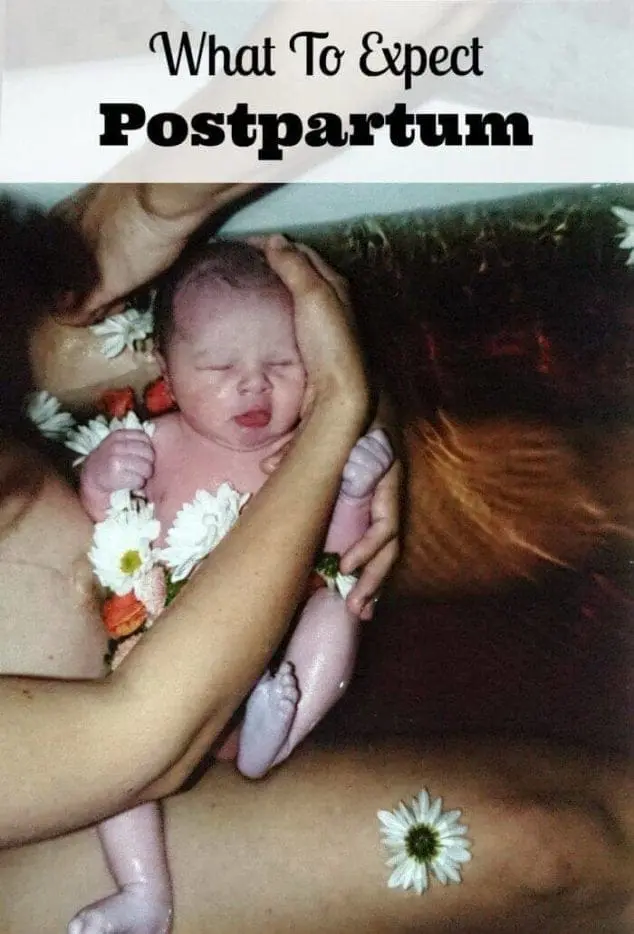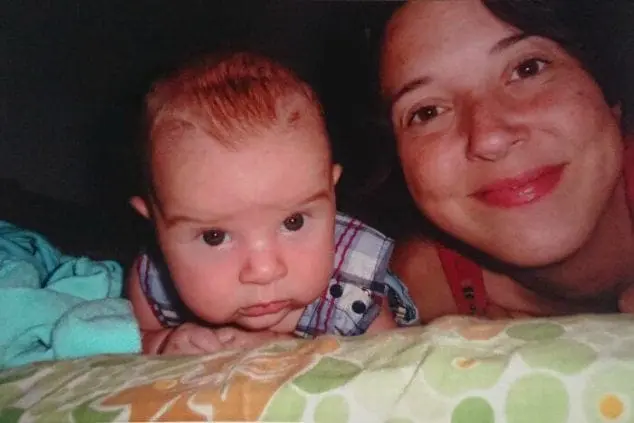When we decide we are ready to have children, most of us have an understanding of how it works. However, it is not really anything more than an a vague idea of what it is really like. When I was pregnant, I began reading books with birth stories. I wanted to inspire myself, educate myself, and just get a peek into the real nitty gritty of it. That is why I am so happy to hear about January Harshe’s new book BIRTH WITHOUT FEAR (affiliate link). It shares many women’s voices and experiences. This means you can gain insight and wisdom as you prepare for your birthing and postpartum journey. I am pleased to be able to share an excerpt from Birth Without Fear (affiliate link below) today. It is called Postpartum Without Fear and it tells you a bit about what to expect during postpartum.
January Harshe originally started a Facebook group with a mission to let women know they have choices in childbirth. Her work has evolved to become an inspiration and support-system to nearly one-million women and their families as they take charge of their pregnancy, birth, and postpartum. January is the mother of six children and she offers warmth and encouragement, free of judgment and unnecessary anxiety. You will enjoy her practical tips as she fills in the considerable gaps of information available to women as they’re preparing to become a mother and for what to expect during postpartum.

January Harshe Shares About What To Expect During Postpartum
Birth Without Fear: The Judgment-Free Guide to Taking Charge of Your Pregnancy, Birth, and Postpartum
by January Harshe
Hachette Books March 5, 2019
Birth Without Fear excerpt reprinted with permission.
_____
Postpartum Without Fear
It’s okay to say I wanted this and it’s hard. It’s okay to say I’m grateful, I love my kid(s), and I’m also struggling and need support. That doesn’t make you a bad parent. It makes you an honest human.
So much of the conversation surrounding postpartum involves the pushing of expectations as well as products. The constant pressure for baby to sleep through the night and to get your body back is discouraging and frustrating. The honest and messy parts of it—leaking breasts, staying up all night watching your baby breathe, and having a hard time going to the bathroom— are not talked about. Why? There are probably many reasons, but for those of us who have been there, our lack of honest conversation later may be due to the postpartum haze we were in. When we are finally on the other side, we forget many of the day-to-day details. For others it may feel embarrassing to discuss the messy parts of postpartum.
Have Open Discussions
The unfortunate thing is that many of us aren’t even having open discussions with our mothers, sisters, aunts, and friends, so we just don’t know what to expect. It’s the beginning of the “feeling alone” aspect of parenthood. It’s not until we whisper over cold— not iced, but cold—coffee that we had a scary thought or that we actually aren’t enjoying breastfeeding that we find out we may not be alone after all, because your friend exclaims, “Me too!”
Here’s the powerful thing: when we use our voices, we give others permission (even though they shouldn’t need it) to use theirs. It’s hard to speak up—to say, “I wanted this, but it’s hard and I need help”—but once you do, you’ll find it’s easier than you may think to find support.
There is much solidarity to be found if we start talking openly about our postpartum experiences, but I also think it’s true that postpartum has more variations of normal than pregnancy and birth. There are so many life factors involved in postpartum life: whether you’re going back to work or staying at home, where you live in the world and what season it is when your baby is born (and how often you can get outside in the fresh air!), how your state/country/province/job deals with parental leave/pumping/ breastfeeding, if you’re dealing with medical issues or developmental issues, how close you live to your support system, if you have multiples, your emotional and psychological health, and on and on. But I will tell you this: postpartum is usually pretty messy. And that’s okay.
The Fourth Trimester
The idea of a “fourth trimester”—and the growing numbers of parents I hear embracing that term in the last few years—has brought us further into the conversation about postpartum, but it still doesn’t take us far enough. The term “fourth trimester” is useful for expressing that postpartum is indeed a period of time that, like the first, second, and third trimesters of pregnancy, will include growth and development. But it also gives the sense that postpartum lasts twelve weeks, which is better than what people used to say—six weeks!—but still not long enough.
If you look up “fourth trimester” online or in most parenting books, you’ll likely find a discussion of baby’s growth during this time. Little to nothing is said about the transition you will go through or are going through. Where did this idea of mamas needing only six to twelve weeks of recovery come from? Why is nobody talking about the growth and development parents will go through during this time? And why do we all feel so alone on this journey?
Listen, twelve weeks is when you just start getting you and baby into a natural rhythm: your baby starts adjusting to being outside the womb, you figure out feeding (one way or another), perhaps you’re navigating going back to work, and you’re starting to get a handle on baby’s sleeping patterns. Maybe you’re feeling like, “Okay, I’ve just started to get my head around this parenting thing. . . and maybe now I can do laundry while the baby rocks in the swing for a bit.”

But then you’ve got the whole rest of that first year postpartum. And then the whole rest of your life as a parent! The last visit with your care provider is at six weeks after your baby’s birth and the so-called fourth trimester “ends” at twelve weeks, but the postpartum adjustment certainly doesn’t stop at either milestone. I feel my postpartum recovery time period is eighteen months to two years, which is around the time my babies usually wean from breastfeeding. If you ask Brandon, he doesn’t think postpartum will end until the kids move out! You might feel differently. And that’s okay.
As author Amely Greeven writes, “In Chinese medicine, it’s said that when the child turns 3, the mother gets half of her chi back.” I kind of love that. The reality is, it takes the time it takes. We’re not giving postpartum equal amounts of space and love that we’re giving everything else. We don’t honor postpartum in the way we honor pregnancy and birth. If we’re going to talk about a fourth trimester, then I want a fifth trimester and a sixth trimester for postpartum as well. Most people don’t even see their care provider after six weeks postpartum. Why shouldn’t your provider be there for you just as much after as before? We need a radically different conversation about postpartum if we are to truly support and empower moms, parents, and families.
Nine Months In, Nine Months Out
Have you seen those “nine months in” and “nine months out” photos some people take? You know, where mom is nine months’ pregnant in one photo and next to it is an “after” photo of her and baby nine months’ postpartum. Let’s talk about postpartum like that. Nine months pregnancy and nine months postpartum. And what happens during those latter nine months that we aren’t talk- ing about? It’s important to give postpartum its own time, because there are just as many questions postpartum as there are through- out pregnancy. There are just as many, if not more, variations of normal during postpartum as there are during pregnancy and birth. To fully support the postpartum parent, we need to honestly and fully give postpartum the space it needs.
The care we receive—and the self-care we practice—in postpartum is just as important as the care we receive during pregnancy and birth. Think about it: we make all these birth plans, we interview providers, we read every birth story we can find, we do all this planning and education for the birth. But here’s the thing: birth is an event. It happens and then it’s done. Yes, it’s important and a lot of processing and healing are needed, but the birth experience is done. Postpartum is everything afterward. It’s literally the rest of your life. It’s parenthood. And what space are we holding, what planning are we doing, what care are we receiving for postpartum? None. Nada. Zilch. It’s forgotten—until people find themselves in the thick of it, and then it’s like, what happened? What do I do now?
Advocate For Yourself
Let’s take back postpartum. I repeat: there are just as many, if not more, variations of normal in postpartum as there are in pregnancy, labor, and birth. Let’s bring it out from the behind the veil of silence or the chorus of “I’m fine” and “I should be able to do this myself” and speak honestly about our experiences. Let’s make space and time for ourselves after birth. Just as much as, if not more than, the space and time we gave ourselves, our bodies, and our babies during pregnancy and labor. Don’t stop advocating for yourself. Advocate for yourself postpartum with as much love and intensity as you would for your baby.
____
Conclusion
Postpartum recovery refers to the period of time following childbirth when a woman’s body undergoes various physical and emotional changes as it returns to its pre-pregnancy state. This recovery period can last for several weeks to months, and it’s crucial for the overall well-being of the mother. It consists of physical healing. The uterus undergoes contractions to return to its normal size. These contractions, often referred to as afterpains, can be felt during breastfeeding. If the mother had a vaginal delivery, the perineum may be sore or swollen. In addition, fluctuations in hormones, especially estrogen and progesterone, can contribute to mood swings. Some women may experience postpartum blues or more serious conditions like postpartum depression.
Sleep is crucial for recovery. New mothers should rest whenever possible, often in short intervals between caring for the baby. Proper nutrition is essential for recovery and for supporting breastfeeding if applicable. Staying well-hydrated is also important, especially for nursing mothers. Regular check-ups with a healthcare provider are important to monitor physical recovery, address any concerns, and discuss family planning options.
I hope you found this excerpt from Birth Without Fear useful in knowing what to expect during postpartum. Feel comfortable asking for the support and guidance that you may need during postpartum. You deserve it!
Related Posts:
Boredom Can Be A Sign Of Postpartum Depression

Norma | We Bananas says
Thank you for this post! No one talks about what to expect post-partum – and it can be such an incredibly challenging time. Kegel exercises can help strengthen pelvic floor muscles, aiding in recovery and preventing issues like urinary incontinence.